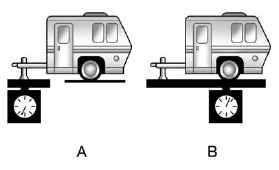Weight of the Trailer Tongue
The tongue load (A) of any trailer is an important weight to measure because it affects the total gross weight of the vehicle. The Gross Vehicle Weight (GVW) includes the curb weight of the vehicle, any cargo carried in it, and the people who will be riding in the vehicle.
If there are a lot of options, equipment, passengers or cargo in the vehicle, it will reduce the tongue weight the vehicle can carry, which will also reduce the trailer weight the vehicle can tow. If towing a trailer, the tongue load must be added to the GVW because the vehicle will be carrying that weight, too.
See Vehicle Load Limits for more information about the vehicle's maximum load capacity.

For a weight-carrying hitch, the trailer tongue (A) should weigh 10 to 15 percent of the total loaded trailer weight (B).
After loading the trailer, weigh the trailer and then the tongue, separately, to see if the weights are proper. If they are not, adjustments might be made by moving some items around in the trailer.
See also:
Compass Calibration Procedure
1. Before calibrating the compass,
check that the compass is set
to the correct variance zone.
See “Compass Variance (Zone)
Procedure” earlier in this
section.
Do not operate any switches
...
Cruise Control Light
The cruise control light is white whenever the cruise control is set, and
turns green when the cruise control is active.
The light turns off when the cruise control is turned off. See Cruise
...
Increasing Speed While Using Cruise Control
If the cruise control system is already activated,
. Press and hold the +RES button on the steering wheel until the desired speed
is reached, then release it.
. To increase vehicle speed in small ...






